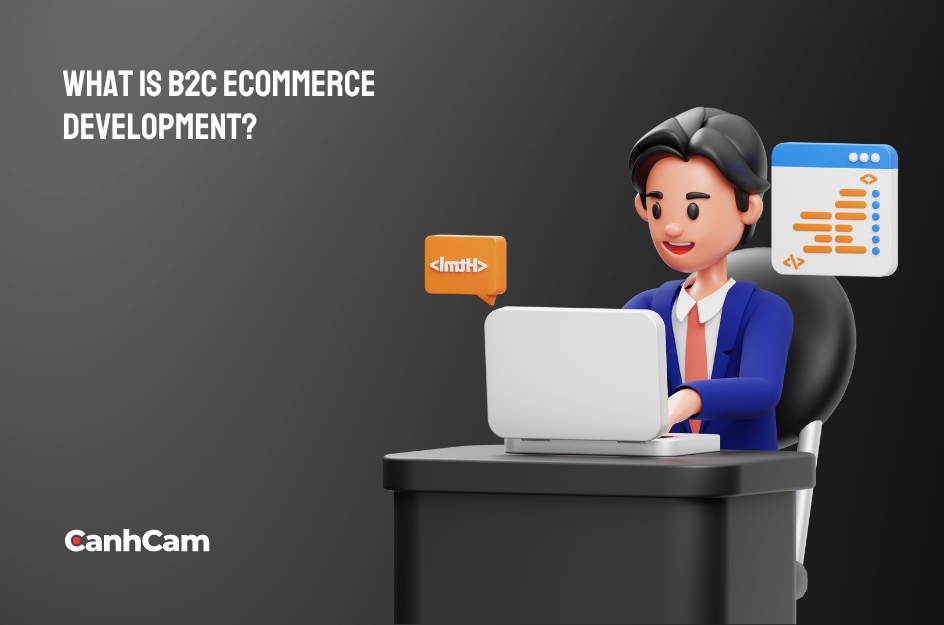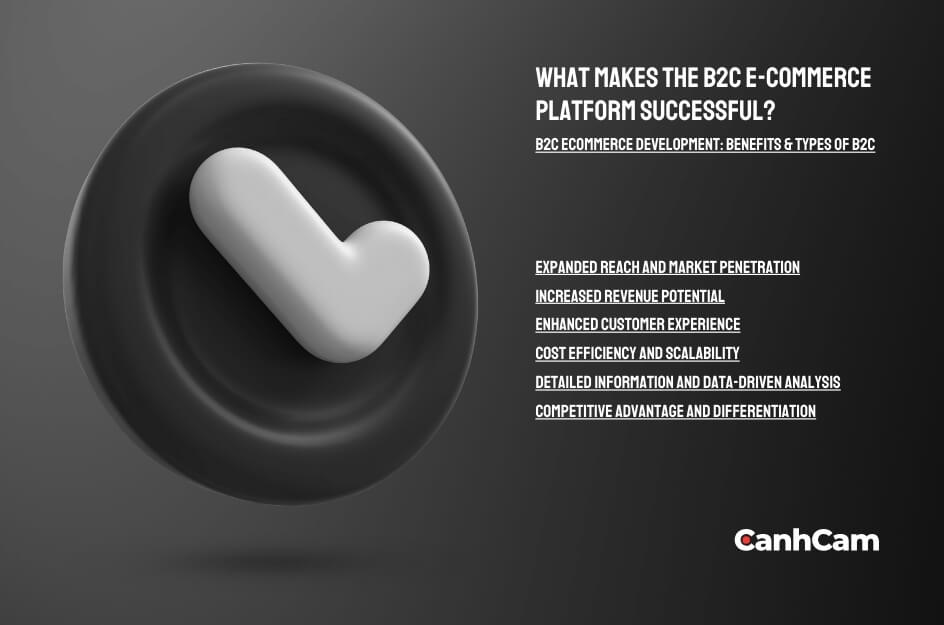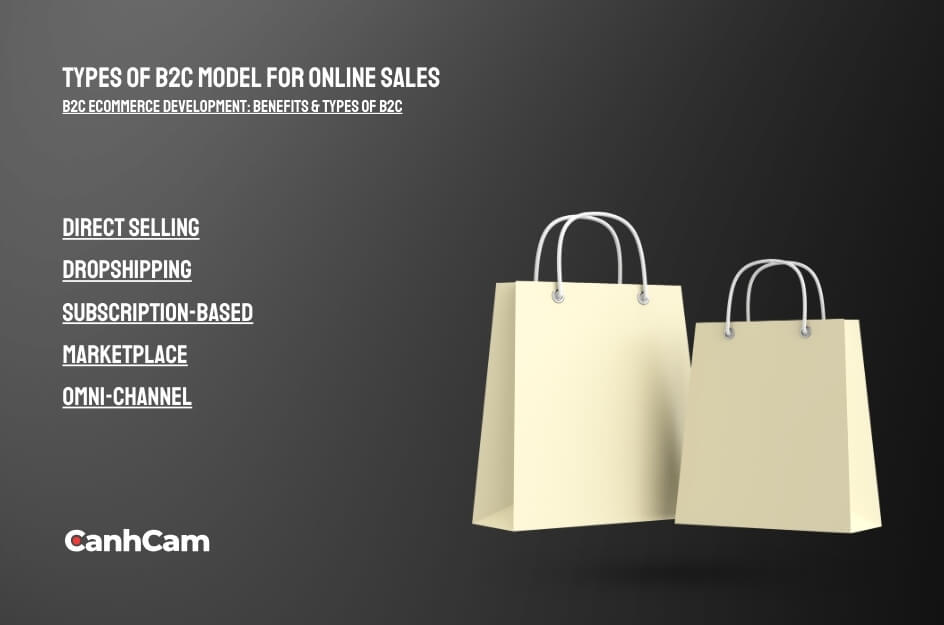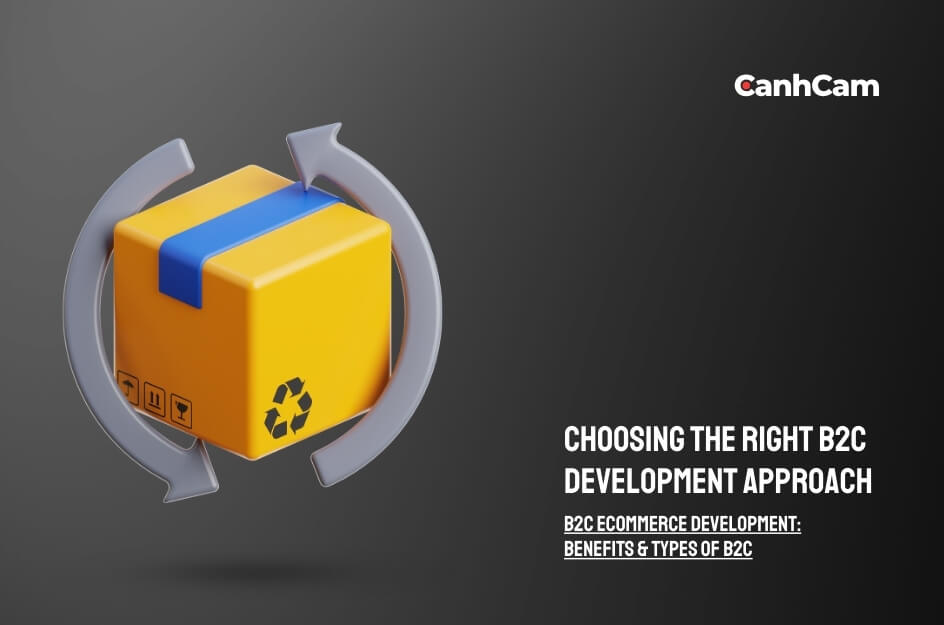Are you ready to harness the vast web of the online retail market and fuel your business growth? Welcome to CanhCam's comprehensive guide to B2C ecommerce development, the key to unlocking success in the dynamic world of online retail.
As the importance of online shopping is growing, every business dealing in the expansion should pay special attention to the establishment of a successful digital presence. B2C ecommerce development comes with a need to have an online store where customers can have a hassle-free shopping experience and the system can handle high transaction volumes.
Whether you're a veteran entrepreneur, a pro marketer, a small firm venturing into online markets, or a multinational enterprise seeking to grow its online sales, this blog will inform you about the intricacies of B2C e-commerce.
What is B2C Ecommerce Development?
B2C Ecommerce Development (Business-to-Consumer); B2C ecommerce is all about creating, running, and improving online stores that sell directly to customers.
It's like a game-changer for businesses, letting them reach customers all over the world without being limited by location. They can now sell their stuff online instead of just through physical stores.
Read more: 3D Ecommerce Website - Everything You Should Know About 3D Ecommerce

What Makes the B2C Ecommerce Development Platform Successful?
Why do customers choose online shopping over visiting real stores? To begin with, consumers are driven by the convenience and security provided by an online shopping website. In this way, they can move between the pages at their own pace and buy whatever they like.
Visit our service: Affordable web design company Melbourne
On the other hand, customers today are receiving more and more personalized features due to the widespread usage of machine learning technology. They are met by products that are precisely the ones they require or those that are chosen judiciously based on their past shopping.
The B2C e-commerce that is online boosts vast business driven by the robust growth of the digital realm. Below, CanhCam will list the top impactful benefits for your business:
1. Expanded Reach and Market Penetration
The advent of B2C e-commerce gives businesses opportunities to reach out to markets that are far and wide across the globe. Through a virtual storefront, companies will be able to connect with customers regardless of their places and break the chains of physical stores, consequently bolstering their market power.
2. Increased Revenue Potential
The quickest attractive feature of this type of development is the chance of having multiplied revenue. Online sale channels can enable businesses to utilize impulse buying, upselling opportunities, and targeted research campaigns to gain on the volume of sales and maximize profits. Furthermore, the constancy of 24/7 online stores is about an unbroken revenue cycle and meeting customers day and night.
3. Enhanced Customer Experience
The modern-day business environment is very competitive. Therefore, giving something special to the customers has become the most important factor in retaining their loyalty and subsequently, hitting the next sales.
Through the B2C e-commerce growth platform, businesses can satisfy customers with smooth and personalized shopping experiences relevant to individual choices. Intuitive navigation, product recommendations, and easy shopping are all techniques that have the goal of maintaining customers and growing these relationships.

4. Cost Efficiency and Scalability
B2C ecommerce development enables businesses to attain cost efficiency and scalability. The lower overhead costs of rent, utilities, and personnel allow organizations to spend the saved money on more efficient use of resources, and allocate it for investment instead of the company development.
Expansion of operations in parallel with the ever-changing requirements of the industry has been made effortless for businesses thanks to the scalability and hence the ability of online stores to grow in capacity quite easily without accruing huge infrastructure costs.
5. Detailed Information and Data-driven Analysis
Through powerful analytics tools and data tracking techniques that are used in B2C ecommerce development, businesses can acquire invaluable customer insights, including behavior, preferences, and trends.
Through this stream of insights, businesses can decide on optimized product offerings, strategic marketing, and operational innovation.
These data-driven insights allow companies to track high-performing products, adjust goal-oriented marketing campaigns, and keep themselves flexible within a consistently changing market.
6. Competitive Advantage and Differentiation
Distinction can play a key role in a crowded marketplace as it helps a brand to draw the attention of the customers and stay ahead of the competitors.
B2C Ecommerce has become critical to businesses as it helps companies to be different by building a strong brand, offering new products, and outstanding customer experience.
Businesses can get ahead of their competitors and eventually emerge as leaders in their niche by presenting marketable merits and serving suitable target groups.

Types of B2C Ecommerce Development
B2C Ecommerce Development can flexibly adapt various models to cater to different market needs and consumer preferences. Let's delve into five different types of B2C models for online sales:
Direct Selling
In the e-commerce model, companies sell products directly to customers through their online store or corporate website. This simple approach excludes intermediaries as businesses keep an eye on the customer experience, pricing, and branding.
The direct sales model is a perfect choice for a business aiming at creating good brand recognition, building customer loyalty, and improving profit margins by eliminating middlemen.
Dropshipping
The Dropshipping model means outsourcing the inventory management and fulfillment to other companies that provide such services as wholesalers or pure vendors. In this model, businesses play out the role of intermediator accepting orders from customers and forwarding them to supplies for realization.
Dropshipping provides multiple benefits including low investment, reduced inventory risk, and scalability. Of course, companies need to be very cautious in finding reliable wholesalers and focus on great customer service to limit problems that may occur, like longer shipping times or product quality issues.
Subscription-based
The subscription model involves supplying customers with products or services regularly in exchange for a monthly subscription fee. This model is popular in industries e.g. beauty, food, and entertainment in which the consumers are interested in getting convenience and prepackaged experience.
Through subscriptions, businesses can maintain a continuous flow of revenue, cultivate customers’ loyalty, and anticipate future sales more effectively. Moreover, the subscription-based models give rise to a chance of upselling, cross-selling, and personalized recommendations to spice up the customer’s general experience.
Marketplace
Marketplace models connect various sellers and consumers on just one platform like a virtual marketplace where trading is carried out. Illustrations of marketplace sites are Amazon, eBay, and Etsy.
Through the operation of the marketplaces that present products from several vendors, customers are gifted with an unrivaled variety, convenience, and competitive prices.
The platforms provide sellers with access to a wide market, structured infrastructure, and marketing support though these come at competitive pricing and fees paid to other sellers.
Omni-channel
An omni-channel strategy, incorporating multiple sales points such as online storefronts, brick-and-mortar stores, social media, and mobile apps, allows customers to shop with ease regardless of the channel they use.
It is this idea that stresses the role of consistency, convenience, and personalization in engaging clients and leading them to their shopping decisions.
The data and analytics-driven approach of businesses enables them to see customer behavior across channels in more depth thus adapting their marketing strategies to reach higher conversion rates and foster customer loyalty.
Choosing the right B2C Development Approach
In B2C ecommerce today, choosing the most suitable development approach is critical.
- Two primary options stand out: Custom development and Platform-based like Shopify.
- Custom development: Specific to your requirements, tailored development allows you the freedom and power to build your online store in which you see it. However, it has higher costs on startup and longer duration in development.
- Platform-Based Solutions: Systems like Shopify come with ready-made templates and features that make them great solutions for those with limited technical expertise or constrained timeframes. For many, they are very inexpensive and effortless to set up, but they can be too rigid for unique needs.

Consider issues like budget, system expertise, the ability to scale, and time to market while making the decision. Coders should be honest about their talent in building specialized products, while platform vendors should give neutral counseling and support to enable enterprises to arrive at the best decision.
In the end, the choice should ultimately align with your business goals and your customer needs, laying the foundation for your success in the world which is as competitive as the B2C e-commerce sector.
Conclusion
B2C ecommerce development represents a paradigm shift in the way businesses engage with consumers in the digital age. By utilizing technology, data-driven analytics, and customer-centric approaches sufficiently, businesses get the chance to grow their business with minimum risk and define themselves as competitors in the dynamic world of e-commerce.
No matter whether you are an experienced player or a newcomer in this B2C field, the B2C ecommerce development will be your guardian angel to the future of retail and the path of success in the digital world.

